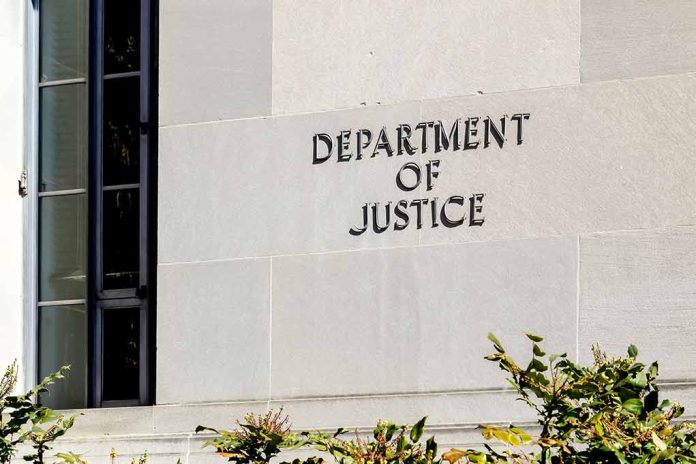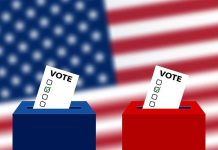
The Biden administration’s Justice Department has filed a lawsuit against Virginia over its recent voter list purges, sparking a heated debate on election procedures and states’ rights.
At a Glance
- DOJ sues Virginia for purging voter rolls within 90 days of an election.
- Lawsuit challenges Governor Glenn Youngkin’s executive order on voter list updates.
- Youngkin calls the lawsuit politically motivated and vows to defend Virginia’s actions.
- Critics argue the purge process could lead to wrongful voter removal.
DOJ Takes Aim at Virginia’s Voter Roll Maintenance
The Justice Department has launched a legal battle against the Commonwealth of Virginia, alleging violations of federal voting laws. The lawsuit targets Virginia’s recent efforts to update its voter rolls, specifically focusing on the removal of individuals identified as non-citizens. This action has ignited a fierce debate over the balance between maintaining accurate voter lists and protecting citizens’ voting rights.
At the heart of the dispute is the National Voter Registration Act’s “Quiet Period Provision,” which prohibits systematic voter list alterations within 90 days of a federal election. The DOJ contends that Virginia’s actions violate this provision and could potentially disenfranchise eligible voters.
The DOJ lawsuit argues that Virginia is in violation of the National Voter Registration Act of 1993 over its efforts to purge voter rolls within 90 days of an election. https://t.co/CJHNuHmu6U
— NBC Politics (@NBCPolitics) October 12, 2024
Youngkin’s Administration Stands Firm
Governor Glenn Youngkin, a Republican, has staunchly defended Virginia’s voter roll maintenance procedures. His administration argues that the program is not only legal but necessary to ensure the integrity of the state’s elections. Youngkin’s executive order, which mandates daily updates to the voting list, has become a focal point of the controversy.
“With the support of our attorney general, we will defend these common sense steps that we are legally required to take, with every resource available to us,” Youngkin said in a statement. “Virginia’s election will be secure and fair, and I will not stand idly by as this politically motivated action tries to interfere in our elections, period.”
The governor’s office maintains that the process is individualized and complies with Virginia law, arguing that the 90-day quiet period does not apply to their actions. This stance sets the stage for a significant legal battle over states’ rights and federal oversight of election procedures.
Concerns Over Voter Disenfranchisement
Critics of Virginia’s voter purge program, including the DOJ, argue that the process risks removing eligible U.S. citizens from the voter rolls. They point to past incidents, such as a purge in Prince William County where 43 out of 162 individuals identified as non-citizens were actually U.S. citizens, as evidence of the potential for error.
“The Commonwealth’s unlawful actions here have likely confused, deterred, and removed U.S. citizens who are fully eligible to vote —the very scenario that Congress tried to prevent when it enacted the Quiet Period Provision,” the DOJ said in its suit, referring to the purging of voter rolls within 90 days of Election Day.
The lawsuit seeks injunctive relief to restore voting rights to affected individuals and prevent future violations. Additionally, the DOJ is calling for remedial actions, including voter education and training for local officials to address any confusion caused by the purge process.
Political Implications and Future Outlook
This legal battle has broader political implications, with some viewing it as a clash between federal overreach and states’ rights to manage their elections. Former President Trump has voiced support for Youngkin, claiming that the DOJ and Vice President Harris are undermining democracy through this lawsuit.
As the case unfolds, it will likely set important precedents for how states can manage their voter rolls while complying with federal law. The outcome could have significant ramifications for election administration across the country, particularly in the lead-up to the 2024 presidential election.
For now, Virginia’s Department of Elections and its commissioner have declined to comment on the ongoing litigation. As the legal process continues, all eyes will be on Virginia as it becomes a battleground for defining the boundaries of state and federal authority in election management.
Sources:
- Justice Department sues Virginia over effort to reduce voter rolls close to Election Day
- Justice Department Sues Virginia for Violating Federal Law’s Prohibition on Systematic Efforts to Remove Voters Within 90 Days of an Election
- Voter purge lawsuits add to disenfranchisement allegations against Youngkin administration
- US Justice Department sues Virginia for purging voters before election
- Justice Dept. sues Virginia over program aimed at eliminating voters
- US Justice Department says Virginia is illegally striking voters off the rolls in new lawsuit
- Why the Department of Justice filed a lawsuit against Virginia elections officials, alleging violation of federal law
- Justice Department sues Virginia over effort to reduce voter rolls close to Election Day
- Justice Department sues Virginia over effort to reduce voter rolls close to Election Day
- DOJ sues Virginia over voter purge; Youngkin calls lawsuit ‘politically motivated’















